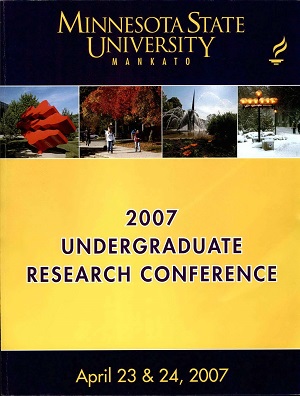Immunolocailzatlon of Actin inTransgenic and Wildtype Murine Myocardium
Location
CSU 203
Start Date
24-4-2007 8:15 AM
End Date
24-4-2007 9:45 AM
Student's Major
Biological Sciences
Student's College
Science, Engineering and Technology
Mentor's Name
Marilyn C. Hart
Mentor's Department
Biological Sciences
Mentor's College
Science, Engineering and Technology
Description
In myocardium, actin and myosin filaments are organized into repeating units of sarcomeres, the basic unit of muscle contraction. Actin Capping Protien (CP) binds to the barbed ends of the actin filament at the Zline, directing and maintaining the proper organization of the thin filament in the sarcomere. CP is a heterodimer composed of an alpha (α) and a beta (β) subunit. Muscle cells contain two β subunit isoforms, β1 and β2. The β1 isoform is present at the Z line; the β2 isoform is found elsewhere including cell-cell junctions. In previous studies, transgenic mice were generated that replaced the β1 isoform with the β2 isoform using the cardiac-specific promoter, the α-myosin heavy chain (α-MyHC). The promoter is turned on at birth in the ventricles with increased expression as a function of murine age. We hypothesized that a decrease in β1 expression will lead to a disorganized myofibrillar structure and that the disorganization will become increasingly severe as a function of murine age. We examined the myocardium of transgenic mice ranging in age from three months to twelve months. Murine hearts were extracted and frozen sections prepared using a cryomicrotome. The tissue sections were fixed, quenched with ethanolamine, permeabilized with methanol, and washed in PBS. The sections were probed with mouse anti-actin primary antibody and anti-mouse IgG rhodamine conjugated secondary antibody. Immunofluorescence studies revealed an increased disorganization of myocardium as a function of murine age, supporting our hypothesis.
Immunolocailzatlon of Actin inTransgenic and Wildtype Murine Myocardium
CSU 203
In myocardium, actin and myosin filaments are organized into repeating units of sarcomeres, the basic unit of muscle contraction. Actin Capping Protien (CP) binds to the barbed ends of the actin filament at the Zline, directing and maintaining the proper organization of the thin filament in the sarcomere. CP is a heterodimer composed of an alpha (α) and a beta (β) subunit. Muscle cells contain two β subunit isoforms, β1 and β2. The β1 isoform is present at the Z line; the β2 isoform is found elsewhere including cell-cell junctions. In previous studies, transgenic mice were generated that replaced the β1 isoform with the β2 isoform using the cardiac-specific promoter, the α-myosin heavy chain (α-MyHC). The promoter is turned on at birth in the ventricles with increased expression as a function of murine age. We hypothesized that a decrease in β1 expression will lead to a disorganized myofibrillar structure and that the disorganization will become increasingly severe as a function of murine age. We examined the myocardium of transgenic mice ranging in age from three months to twelve months. Murine hearts were extracted and frozen sections prepared using a cryomicrotome. The tissue sections were fixed, quenched with ethanolamine, permeabilized with methanol, and washed in PBS. The sections were probed with mouse anti-actin primary antibody and anti-mouse IgG rhodamine conjugated secondary antibody. Immunofluorescence studies revealed an increased disorganization of myocardium as a function of murine age, supporting our hypothesis.
Recommended Citation
Davis, Jacob T. and Meghan Bohland. "Immunolocailzatlon of Actin inTransgenic and Wildtype Murine Myocardium." Undergraduate Research Symposium, Mankato, MN, April 24, 2007.
https://cornerstone.lib.mnsu.edu/urs/2007/oral-session-11/2




